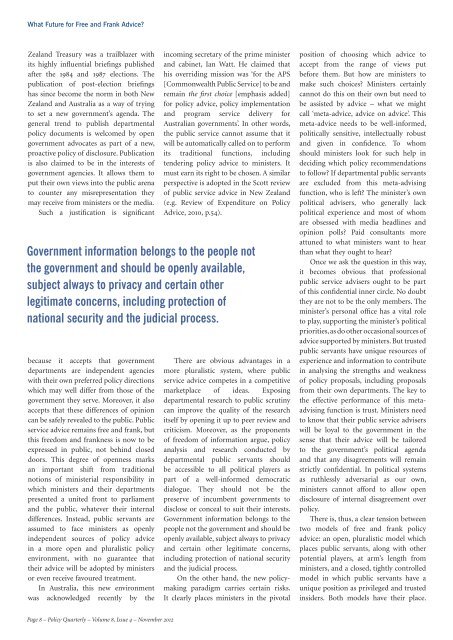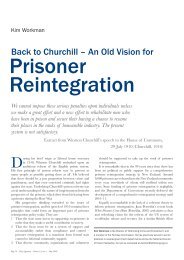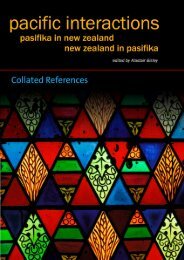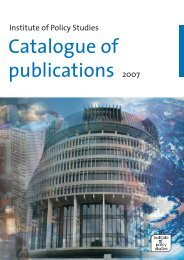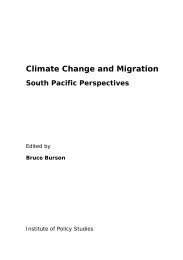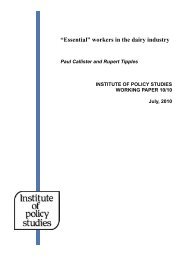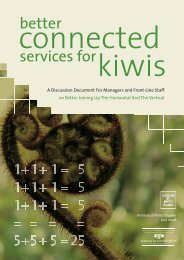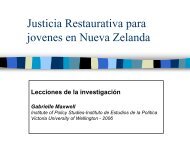PDF File - Institute for Governance and Policy Studies - Victoria ...
PDF File - Institute for Governance and Policy Studies - Victoria ...
PDF File - Institute for Governance and Policy Studies - Victoria ...
You also want an ePaper? Increase the reach of your titles
YUMPU automatically turns print PDFs into web optimized ePapers that Google loves.
What Future <strong>for</strong> Free <strong>and</strong> Frank Advice<br />
Zeal<strong>and</strong> Treasury was a trailblazer with<br />
its highly influential briefings published<br />
after the 1984 <strong>and</strong> 1987 elections. The<br />
publication of post-election briefings<br />
has since become the norm in both New<br />
Zeal<strong>and</strong> <strong>and</strong> Australia as a way of trying<br />
to set a new government’s agenda. The<br />
general trend to publish departmental<br />
policy documents is welcomed by open<br />
government advocates as part of a new,<br />
proactive policy of disclosure. Publication<br />
is also claimed to be in the interests of<br />
government agencies. It allows them to<br />
put their own views into the public arena<br />
to counter any misrepresentation they<br />
may receive from ministers or the media.<br />
Such a justification is significant<br />
because it accepts that government<br />
departments are independent agencies<br />
with their own preferred policy directions<br />
which may well differ from those of the<br />
government they serve. Moreover, it also<br />
accepts that these differences of opinion<br />
can be safely revealed to the public. Public<br />
service advice remains free <strong>and</strong> frank, but<br />
this freedom <strong>and</strong> frankness is now to be<br />
expressed in public, not behind closed<br />
doors. This degree of openness marks<br />
an important shift from traditional<br />
notions of ministerial responsibility in<br />
which ministers <strong>and</strong> their departments<br />
presented a united front to parliament<br />
<strong>and</strong> the public, whatever their internal<br />
differences. Instead, public servants are<br />
assumed to face ministers as openly<br />
independent sources of policy advice<br />
in a more open <strong>and</strong> pluralistic policy<br />
environment, with no guarantee that<br />
their advice will be adopted by ministers<br />
or even receive favoured treatment.<br />
In Australia, this new environment<br />
was acknowledged recently by the<br />
incoming secretary of the prime minister<br />
<strong>and</strong> cabinet, Ian Watt. He claimed that<br />
his overriding mission was ‘<strong>for</strong> the APS<br />
[Commonwealth Public Service] to be <strong>and</strong><br />
remain the first choice [emphasis added]<br />
<strong>for</strong> policy advice, policy implementation<br />
<strong>and</strong> program service delivery <strong>for</strong><br />
Australian governments’. In other words,<br />
the public service cannot assume that it<br />
will be automatically called on to per<strong>for</strong>m<br />
its traditional functions, including<br />
tendering policy advice to ministers. It<br />
must earn its right to be chosen. A similar<br />
perspective is adopted in the Scott review<br />
of public service advice in New Zeal<strong>and</strong><br />
(e.g. Review of Expenditure on <strong>Policy</strong><br />
Advice, 2010, p.54).<br />
Government in<strong>for</strong>mation belongs to the people not<br />
the government <strong>and</strong> should be openly available,<br />
subject always to privacy <strong>and</strong> certain other<br />
legitimate concerns, including protection of<br />
national security <strong>and</strong> the judicial process.<br />
There are obvious advantages in a<br />
more pluralistic system, where public<br />
service advice competes in a competitive<br />
marketplace of ideas. Exposing<br />
departmental research to public scrutiny<br />
can improve the quality of the research<br />
itself by opening it up to peer review <strong>and</strong><br />
criticism. Moreover, as the proponents<br />
of freedom of in<strong>for</strong>mation argue, policy<br />
analysis <strong>and</strong> research conducted by<br />
departmental public servants should<br />
be accessible to all political players as<br />
part of a well-in<strong>for</strong>med democratic<br />
dialogue. They should not be the<br />
preserve of incumbent governments to<br />
disclose or conceal to suit their interests.<br />
Government in<strong>for</strong>mation belongs to the<br />
people not the government <strong>and</strong> should be<br />
openly available, subject always to privacy<br />
<strong>and</strong> certain other legitimate concerns,<br />
including protection of national security<br />
<strong>and</strong> the judicial process.<br />
On the other h<strong>and</strong>, the new policymaking<br />
paradigm carries certain risks.<br />
It clearly places ministers in the pivotal<br />
position of choosing which advice to<br />
accept from the range of views put<br />
be<strong>for</strong>e them. But how are ministers to<br />
make such choices Ministers certainly<br />
cannot do this on their own but need to<br />
be assisted by advice – what we might<br />
call ‘meta-advice, advice on advice’. This<br />
meta-advice needs to be well-in<strong>for</strong>med,<br />
politically sensitive, intellectually robust<br />
<strong>and</strong> given in confidence. To whom<br />
should ministers look <strong>for</strong> such help in<br />
deciding which policy recommendations<br />
to follow If departmental public servants<br />
are excluded from this meta-advising<br />
function, who is left The minister’s own<br />
political advisers, who generally lack<br />
political experience <strong>and</strong> most of whom<br />
are obsessed with media headlines <strong>and</strong><br />
opinion polls Paid consultants more<br />
attuned to what ministers want to hear<br />
than what they ought to hear<br />
Once we ask the question in this way,<br />
it becomes obvious that professional<br />
public service advisers ought to be part<br />
of this confidential inner circle. No doubt<br />
they are not to be the only members. The<br />
minister’s personal office has a vital role<br />
to play, supporting the minister’s political<br />
priorities, as do other occasional sources of<br />
advice supported by ministers. But trusted<br />
public servants have unique resources of<br />
experience <strong>and</strong> in<strong>for</strong>mation to contribute<br />
in analysing the strengths <strong>and</strong> weakness<br />
of policy proposals, including proposals<br />
from their own departments. The key to<br />
the effective per<strong>for</strong>mance of this metaadvising<br />
function is trust. Ministers need<br />
to know that their public service advisers<br />
will be loyal to the government in the<br />
sense that their advice will be tailored<br />
to the government’s political agenda<br />
<strong>and</strong> that any disagreements will remain<br />
strictly confidential. In political systems<br />
as ruthlessly adversarial as our own,<br />
ministers cannot af<strong>for</strong>d to allow open<br />
disclosure of internal disagreement over<br />
policy.<br />
There is, thus, a clear tension between<br />
two models of free <strong>and</strong> frank policy<br />
advice: an open, pluralistic model which<br />
places public servants, along with other<br />
potential players, at arm’s length from<br />
ministers, <strong>and</strong> a closed, tightly controlled<br />
model in which public servants have a<br />
unique position as privileged <strong>and</strong> trusted<br />
insiders. Both models have their place.<br />
Page 8 – <strong>Policy</strong> Quarterly – Volume 8, Issue 4 – November 2012


